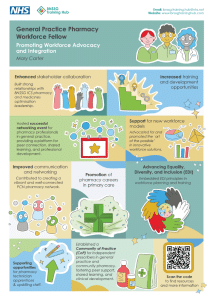The role of Clinical Pharmacists
Clinical Pharmacists are an integral part of the general practice team, working alongside GPs, nurses, and other healthcare professionals to optimise patient care. They provide expert medication management, improve prescribing safety, and enhance patient outcomes through direct consultations. Their role includes reviewing and reconciling medications after hospital discharge, reducing polypharmacy risks, and promoting adherence to prescribed treatments. They also assist with managing complex medication regimens and providing specialist advice on high-risk medicines.
The Role of Clinical Pharmacists in General Practice
NHS England Clinical Pharmacists.


